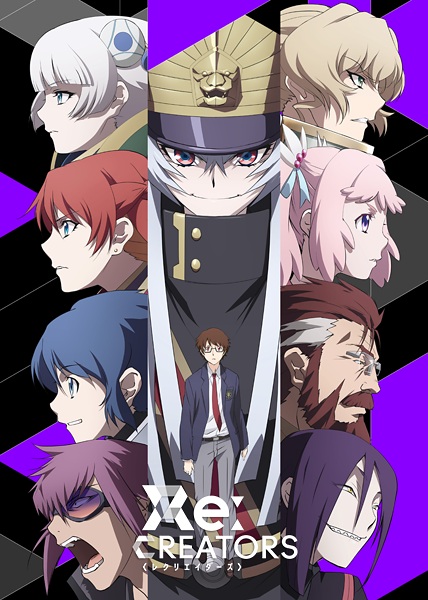
It would be a disservice to Re:CREATORS to call the show “meta”, although it certainly takes aim at those of us who consume (or even moreso, create) fiction. When we talk about fiction nowadays, “meta” seems to be a good way to indicate that a show thinks that breaking the fourth wall and giving a knowing wink to the audience from time to time is the height of comedy, and to its credit Re:CREATORS plays itself straight, and generally pretty dramatic rather than comedic. Even in a story about characters coming to life from their stories, materializing in the real world and meeting the creators to whom they owe all their problems in life, there's not so much a sense that we run the risk of bumping into our favorite anime characters on the street tomorrow so much as there is a sympathy for these poor souls. They're doomed to struggle for our entertainment, because most stories can't exist without tension and sadness. It's a different sort of sympathy than the one we would feel towards a relatable character in an engaging fictional world, neither of which make much of a showing here, and as a new perspective on fiction I found it very welcome in my anime lineup for the first number of weeks it ran.
Part of the reason I felt that connection to the show early on is how many of those thematic elements of adversity and control were frontloaded as the fictional creations struggled to deal with being in a completely new world. Sure, they were all typecast into their roles, from Meteora the helpful mage to Selesia the headstrong swordsman, the magical girl Mamika and the paladin Alicetaria, the street fighter Yuuya and the gunslinging Blitz, the young mecha pilot Kanoya and the twisted cruel Magane. They were typecast but it was almost necessary for them to fall into clear tropes, because they're fictional characters in the worlds of their creators before they're fictional characters of Hiroe Rei's world, and so at the start they need to be identifiable as products of fiction. It creates a foil to their ways of fighting with each other, to their authors peppered around Tokyo, and to the mysterious uniformed girl who rises up as an existential threat to the world.
To me that girl is the main draw of Re:CREATORS, aside from people who want flashy battles directed by Aoki Ei and set to Sawano Hiroyuki's trademark soundtrack, the same combination that led to Aldnoah.Zero (to an eerily similar effect). The girl is bold in her strategies, nearly immortal in her fighting technique, and bearing a deep-seated hatred for the world. She is the counterpoint to characters like Selesia, Kanoya, and Blitz, who all bear some resentment towards their creators for putting them through hell for what turns out to be little more than a need to sell copies and get an anime adaptation. The girl, by contrast, finds her hatred in what Tokyo did to her creator, and her hatred of the fabric of our world is what ultimately can unite the rest of the cast in finding good in this realm of gods; at some point Yuuya draws a poignant comparison between the authors of Tokyo and the inevitable forces of fate. And throughout the show, the girl is the one who provoked most of my thoughts on the interplay of fiction and reality, with a somewhat annoying archaic speech pattern but plenty of substance coming behind it.
But for all she contributes and all the ways the characters set up these prying questions, things get mired in plot, technobabble, and the relatively static personalities that don't break much new ground even in this new world together. Some of them like Kanoya or Blitz may as well have not existed, while others like Magane and Meteora practically determine the entire course of the show for better or worse. For as much as the show tries to give a backstory or uniqueness to the cast, most of the creations get little more than a cool ability or a rival from their work appearing to oppose them in the final battle. If anything the supporting cast of normal human authors seem to find the most emotional growth out of the experience, but they also only seem to make it on-screen when they're needed to push their creations along, either emotionally or with new guns to use. In particular the shy high school Souta is the only human who could clearly count as a main character, but while his emotional contribution is potent, his tangible contribution is virtually non-existent until the very end, and even then it feels more like the characters trying to play up his achievement rather than a true job done well.
Thankfully the show breaks neatly into two parts. Part one is where all the questions are posed, and some of the more plot-related ones answered. The second half is a slog up until the final battle, which can get plenty overwrought but has the neat action one would expect from Black Lagoon's author and Fate/zero's director. In their own way, each of them has plenty that's worthwhile, and so depending on your desire for a light show and suspension of disbelief one of the two is worth a couple episodes of time at least. Ultimately the main issue is that both of the halves have their issues with development and pacing at just eleven episodes per, and together they wear out their welcome pretty fast.